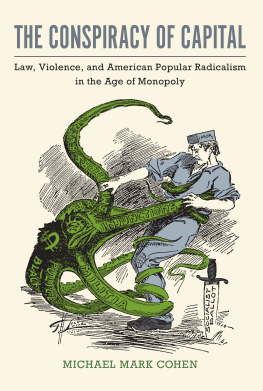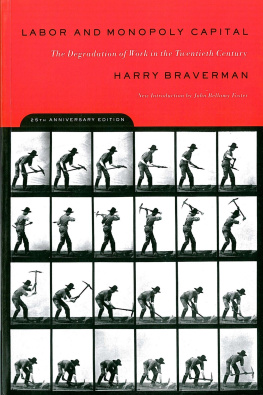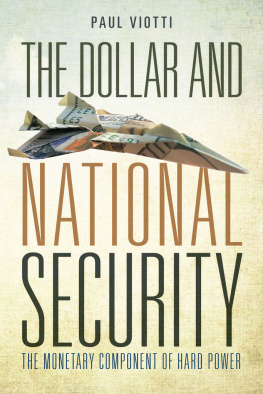Baran Paul A. - Monopoly capital: an essay on the American economic and social order
Here you can read online Baran Paul A. - Monopoly capital: an essay on the American economic and social order full text of the book (entire story) in english for free. Download pdf and epub, get meaning, cover and reviews about this ebook. City: New York, year: 1966, publisher: Monthly Review Press, genre: Politics. Description of the work, (preface) as well as reviews are available. Best literature library LitArk.com created for fans of good reading and offers a wide selection of genres:
Romance novel
Science fiction
Adventure
Detective
Science
History
Home and family
Prose
Art
Politics
Computer
Non-fiction
Religion
Business
Children
Humor
Choose a favorite category and find really read worthwhile books. Enjoy immersion in the world of imagination, feel the emotions of the characters or learn something new for yourself, make an fascinating discovery.

- Book:Monopoly capital: an essay on the American economic and social order
- Author:
- Publisher:Monthly Review Press
- Genre:
- Year:1966
- City:New York
- Rating:4 / 5
- Favourites:Add to favourites
- Your mark:
- 80
- 1
- 2
- 3
- 4
- 5
Monopoly capital: an essay on the American economic and social order: summary, description and annotation
We offer to read an annotation, description, summary or preface (depends on what the author of the book "Monopoly capital: an essay on the American economic and social order" wrote himself). If you haven't found the necessary information about the book — write in the comments, we will try to find it.
Baran Paul A.: author's other books
Who wrote Monopoly capital: an essay on the American economic and social order? Find out the surname, the name of the author of the book and a list of all author's works by series.
Monopoly capital: an essay on the American economic and social order — read online for free the complete book (whole text) full work
Below is the text of the book, divided by pages. System saving the place of the last page read, allows you to conveniently read the book "Monopoly capital: an essay on the American economic and social order" online for free, without having to search again every time where you left off. Put a bookmark, and you can go to the page where you finished reading at any time.
Font size:
Interval:
Bookmark:
Thank you for buying this ebook, published by NYU Press.
Sign up for our e-newsletters to receive information about forthcoming books, special discounts, and more!
Sign Up!
A publisher of original scholarship since its founding in 1916, New York University Press Produces more than 100 new books each year, with a backlist of 3,000 titles in print. Working across the humanities and social sciences, NYU Press has award-winning lists in sociology, law, cultural and American studies, religion, American history, anthropology, politics, criminology, media and communication, literary studies, and psychology.
An Essay on the American Economic and Social Order
PAUL A. BARAN
and
PAUL M. SWEEZY

Copyright 1966 by Paul M. Sweezy
All Rights Reserved
ISBN: 978-0-85345-073-3
Monthly Review Press
146 West 29th Street, Suite 6W
New York, NY 10001
www.monthlyreview.org
MONOPOLY CAPITAL
An Essay on the American Economic and Social Order
For Che
Early in 1962 Robert F. Kennedy, then Attorney General in his brothers administration, traveled around the world as a sort of good-will ambassador of the United States. On his return he addressed the annual luncheon of the Associated Press. In his talk, printed in the New York Times of April 24th, he related the following incident:
I was introduced in Indonesia to another large student body and a boy at the end of my speech got up and asked a question. In the course of this question he described the United States as a system of monopolistic capitalism. And when he said that expression, half the student body applauded.
So I said, Well now, Id like to find out. I am a representative of the United States here. What is it that you mean by monopolistic capitalism. What is it that defines that description in the United States? You said it in a derogatory sense. What is it that meets the description in the United States? What do you mean by monopolistic capitalism?
And he had no answer. And I said, Well now, anybody who clapped, anybody who applauded when this gentleman used that expressionwhat is it that you understand by monopolistic capitalism? And not one of them would come forward.
If Kennedy thought that the refusal of his audience to debate the subject of monopoly capitalism indicated a lack of knowledge, he was surely very much mistaken. Indonesian students, like their counterparts in the underdeveloped countries all over the world, know a great deal about monopoly capitalism, having seen its ugliest face and suffered the consequences of its global policies in their own lives. But it is hardly surprising if they feel that it is too serious a subject for glib definitions or clever debating points.
Kennedys questions remain, however, and we may pay him the compliment of assuming that they reflect a state of genuine ignorance which is shared by most of his countrymen. This book is addressed to any of them who are really interested in answers and are willing to put in the necessary time and effort to gain some understanding of an extraordinarily complicated and difficult subject. We hope too that it will be of use to the students of Indonesia and all the other countries of the underdeveloped world in achieving a fuller and clearer comprehension of a reality whose importance they already recognize.
One type of criticism we would like to answer in advance. We shall probably be accused of exaggerating. It is a charge to which we readily plead guilty. In a very real sense the function of both science and art is to exaggerate, provided that what is exaggerated is truth and not falsehood. Anyone who wishes to claim that we have overstepped the bounds of this proviso should be prepared to present his own version of the truth about American society today. Such efforts we welcome. For the rest the final test of truth is not anyones subjective judgment but the objective course of history.
This book has had an unusually long period of gestationalmost exactly ten years from the first tentative outline to the date of publication. Factual material for illustrative and narrative purposes was gathered and used as needed, but there has been no systematic attempt at updating, nor have we tried to take account of all the significant works bearing on one aspect or another of our subject as they have appeared. This is, as the subtitle states, an essay, not a treatise, and it makes no pretense to comprehensiveness.
Most of our intellectual debts will be clear from the text and footnotes and call for no special mention here. For careful editing and innumerable improvements in presentation and style we are indebted, as both of us have been on many occasions in the past, to John Rackliffe.

The foregoing is a reconstruction from notes jotted down some two years ago of what we intended to include in the
Though Baran never saw the final form of the manuscript which went to the typist and the printer, I must emphasize that this in no way diminishes the joint character of the book. The ideas and the structure we worked out in a continuous interchange beginning long before the first outline was set down on paper. Whatever was drafted by one of us was criticized at length by the other, and in most cases redrafted and recriticized more than once. Everything now in the book had been through this process before Barans death. Apart from putting the entire manuscript into finished form, the only thing I have done has been to leave out what would have been two additional chapters. This material was in rough draft at the time of his death, but in each case one or the other of us had raised important questions which still remained to be discussed and resolved. Since neither chapter was essential to the theme of the essay as a whole, the best solution seemed to be to omit them altogether. I reached this conclusion the more easily since even without these chapters the book turned out to be longer than I had expected or we had originally intended.
Paul M. Sweezy
New York City
January 1, 1966
The truth is the whole.Hegel
Two centuries ago, a former European colony decided to catch up with Europe. It succeeded so well that the United States of America became a monster in which the taints, the sickness, and the inhumanity of Europe have grown to appalling dimensions.
Frantz Fanon
INTRODUCTION
The situation in the social sciences in the United States today is paradoxical. The number of research workers and teachers is rapidly rising. Their training and command of their disciplines, including the ability to use precise mathematical reasoning and sophisticated statistical methods, are far above the levels attained by their predecessors of even one generation ago. Universities, foundations, and governments organize research projects and dispense grants on an unprecedented scale. Books, reports, and articles are turned out in a never-ending stream. And yet all this high-powered intellectual activity has yielded few important new or fresh insights into the way our society works and where it is headed.
Next pageFont size:
Interval:
Bookmark:
Similar books «Monopoly capital: an essay on the American economic and social order»
Look at similar books to Monopoly capital: an essay on the American economic and social order. We have selected literature similar in name and meaning in the hope of providing readers with more options to find new, interesting, not yet read works.
Discussion, reviews of the book Monopoly capital: an essay on the American economic and social order and just readers' own opinions. Leave your comments, write what you think about the work, its meaning or the main characters. Specify what exactly you liked and what you didn't like, and why you think so.







